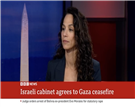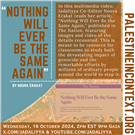The Under-Secretary for Legal Affairs and United Nations Legal Counsel, Patricia O Brien, recently addressed the American Society of International Law Midyear Meeting at the University of Georgia School of Law. In her representative capacity, O’Brien dedicated her luncheon remarks to a discussion about the still-developing concept of responsibility to protect. (She contributed the full remarks as an IntLawGrrls post.)
Also known by its shorthand abbreviation, R2P, the doctrine of responsibility to protect suggests that sovereignty is not a privilege that shields states from accountability; rather, in addition to international privileges, sovereignty entails responsibility towards a state`s population. It gained increased media and diplomatic attention during the Libyan uprising, when states deliberated whether or not to use armed force to suppress regime violence directed at civilians. Proponents of humanitarian intervention prevailed, and as IntLawGrrls posts have chronicled, the rest is history.
O’Brien characterized the intervention as a “successful” exercise that marked another step in the evisceration of the “barricade of sovereignty.” In fairness, she also highlighted that moving forward in situations that implicate the concept of R2P, “sober judgment is needed before undertaking any operation which places civilians at risk.” Her overall assessment, however, did not adequately deal with the details of the Libyan intervention that may mute enthusiasm for similar operations in the future.
She did not dwell, for example, on the critique that the NATO operation far exceeded its UN Security Council Resolution 1973 authorization to prevent a massacre in Benghazi and became a campaign explicitly aimed at regime change. She quickly dismissed criticism of NATO’s alleged criminal violations, by citing a UN Report that hardly acquitted the North Atlantic armed forces of significant wrongdoing. Nor did she address the substantial backlash by African nations, whom supported the Libyan operation for politically expedient reasons, but quickly redoubled their efforts to assert the inviolability of African sovereignty.
O’Brien’s account captures certain critical aspects of the Libyan uprising and the international community’s response to it. However, I think it is only one side of the argument and overlooks important facts and consequences that should be considered today in similar discussions about Syria, which the UN Legal Counsel went on to discuss. The Syrian uprising, which began in March 2011 and which the Red Cross has declared a civil war, has taken the lives of an estimated 20-30,000 people. That the situation merits international attention and vigor is an understatement. The problem, however, is the particular form of this international attention.
O’Brien does not provide a prescription for the situation in Syria. She simply makes clear that “the Syrian authorities have disregarded their responsibilities,” and that the international community must find ways to “stop the violence.” She leaves for question how to do that but emphasizes that the Security Council must take “collective action in a timely and decisive manner” as part of the R2P doctrine. The vagueness of these comments, together with the discussion of the Libyan intervention, leaves open to interpretation whether human rights practitioners and diplomats should consider humanitarian intervention in Syria.
For the sake of adding clarity and to address the implicit suggestions made by the open-ended nature of O’Brien’s comments, I want to highlight why Syria is not like Libya, why intervention in Libya remains controversial, and how that should shape our thinking around what can and should be done to stop the violence there. In particular, we should consider why intervention in Syria, similar to the collective action taken in Libya, is inappropriate:
- Syria, unlike Libya, is not constituted of vast swaths of sparsely populated land. To the contrary, it is densely populated and relatively small.
- Unlike Libya, Syria is not surrounded by regimes happy to see it fall. Its survival, or lack thereof, implicates regional and international relations in a myriad of significant ways, i.e., the conflict involves the question of Palestine, the question of resistance involving the Syria-Iran-Hizballah axis, the question of balance of power in the region involving Saudi Arabia and Qatar in the opposing camp, and the question of international forces that are attempting to leverage their power in a changing region – including the United States, European countries, Russia, and China.
- Also, unlike Libya’s opposition, which was at least nominally united as a single body within the National Transition Council, the opposition’s local military wing – the Free Syrian Army – and the principal political opposition outside Syria – the Syrian National Council – are not united as a single body. Moreover, the internal opposition, now comprising some two hundred factions, is fragmented and some groups within harbor goals that are fundamentally antithetical to others. They adopt methods that mirror the regime`s brutality and some of these factions are wholly or partially comprised of foreign fighters with no roots in Syrian society On whose behalf will the international community intervene? Which civilians will be spared and which will be labeled as legitimate targets for their ongoing support of, and involvement with, the Syrian regime?
Most significantly, while no one can disagree with O’Brien’s sweeping assertion that the “violence must be stopped,” this raises questions about the particular kind of violence with which we are taking issue, and whether or not intervention, for example, has the capacity to stop it.
Consider that between the beginning of the Libyan uprising and the passage of Resolution 1973, approximately 1-2,000 civilians were killed. By the end of the NATO bombing campaign, 30-50,000 lives had been lost. The casualties among its Arab counterparts whose regimes were similarly overthrown-- Tunisia, 338; Egypt, 846; Yemen, 2,000-- pale in comparison.
Moreover, due to the heavy militarization of Libyan opposition groups, violence, and the struggle for power more specifically, continue to characterize the Libyan landscape today. While intervention may stem violence meted out by the Syrian authorities, it is almost certain that it will not stop the violence altogether – that will continue to subsume Syria in its aftermath.
This in no way is meant to make equal the violence meted out by regime and opposition forces. The state has responsibilities and duties to protect its civilians, duties that make it morally more culpable in all instances. That does not diminish, however, the shortsightedness of applying cookie-cutter prescriptions-- in this case, forceful intervention-- to the Syrian conflict. While O’Brien did not explicitly advocate for intervention, the open-ended nature of her comments, together with her characterization of the Libyan operation, left intervention as a viable possibility in the minds of her audience.
My critique is meant to temper such persuasions for intervention, if they indeed exist, and to appeal for more constructive and nuanced responses. The well-being of Syria, its people, the Arab region, and humanity writ large is dependent on the care we take to address a crisis we failed to prevent in the first place, and have the potential to make much worse.
[This piece was originally posted on IntLawGrrls]
![[Image of a UN Peacekeeping Forces Helmet. Image by Daniel Košinár. From Wikimedia Commons.]](https://kms.jadaliyya.com/Images/357x383xo/bluehelmetschmelz.jpg)










